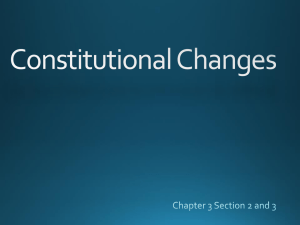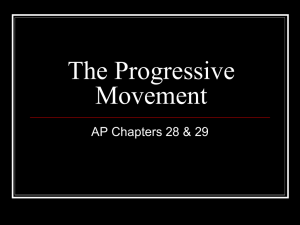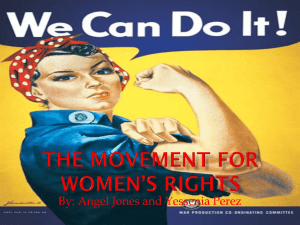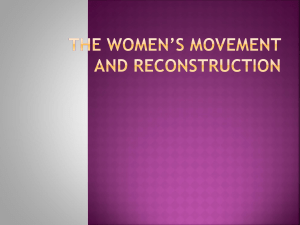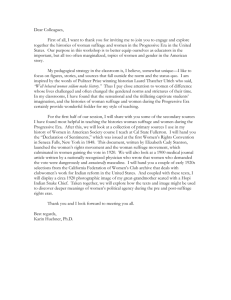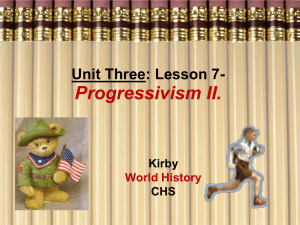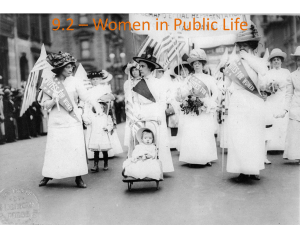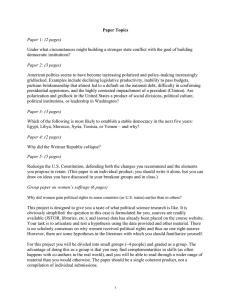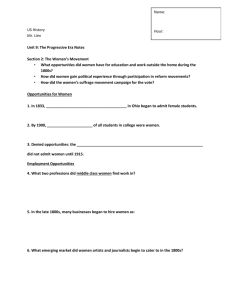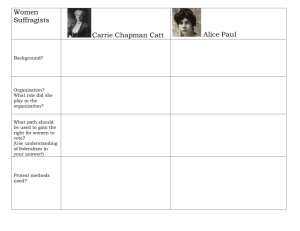Mr. Corrado US History Document Based Question
advertisement
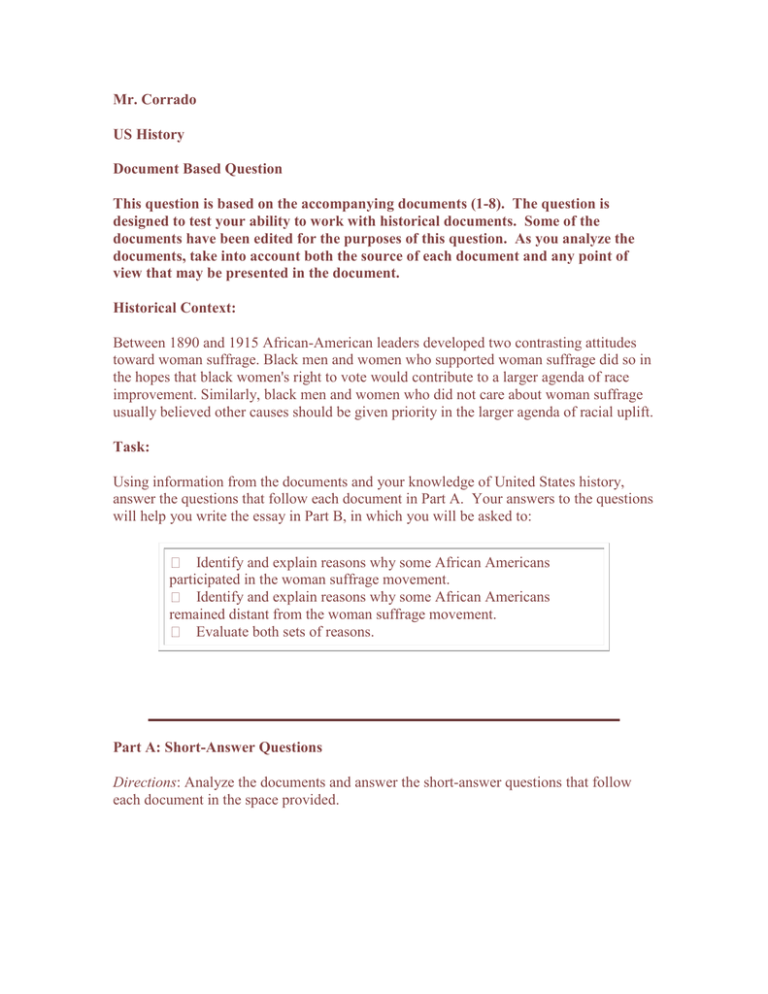
Mr. Corrado US History Document Based Question This question is based on the accompanying documents (1-8). The question is designed to test your ability to work with historical documents. Some of the documents have been edited for the purposes of this question. As you analyze the documents, take into account both the source of each document and any point of view that may be presented in the document. Historical Context: Between 1890 and 1915 African-American leaders developed two contrasting attitudes toward woman suffrage. Black men and women who supported woman suffrage did so in the hopes that black women's right to vote would contribute to a larger agenda of race improvement. Similarly, black men and women who did not care about woman suffrage usually believed other causes should be given priority in the larger agenda of racial uplift. Task: Using information from the documents and your knowledge of United States history, answer the questions that follow each document in Part A. Your answers to the questions will help you write the essay in Part B, in which you will be asked to: Identify and explain reasons why some African Americans participated in the woman suffrage movement. Identify and explain reasons why some African Americans remained distant from the woman suffrage movement. Evaluate both sets of reasons. Part A: Short-Answer Questions Directions: Analyze the documents and answer the short-answer questions that follow each document in the space provided. Du Bois and Washington on Woman Suffrage Document 1 Margaret Murray Washington was the wife of Booker T. Washington and the Dean of Women at Tuskegee Institute, a school founded by her husband. Suffrage.--Colored women, quite as much as colored men, realize that if there is ever to be equal justice and fair play in the protection in the courts everywhere for all races, then there must be an equal chance for all women as well as men to express their preference through their votes. There are certain things so sure to come our way that time in arguing them is not well spent. It is simply the cause of right which in the end always conquers, no matter how fierce the opposition. Personally woman suffrage has never kept me awake at night, but I am sure before this country is able to take its place amongst the great democratic nations of the earth it has got to come to the place where it is willing to trust its citizens, black as well as white, women as well as men. --Excerpt from Margaret Murray Washington, "Club Work Among Negro Women," 1895 1. What reason did Margaret Murray Washington give for not actively pursuing the right to vote for women? ________________________________________________________________________ __________________ ________________________________________________________________________ __________________ ________________________________________________________________________ __________________ 2. What did you think Washington meant when she wrote that woman suffrage had never kept her awake at night? ________________________________________________________________________ __________________ ________________________________________________________________________ __________________ Du Bois and Washington on Woman Suffrage Document 2 As the woman suffrage movement gained momentum, Booker T. Washington issued the following statement to the New York Times: I am in favor of every measure that will give to woman, the opportunity to develop to the highest possible extent, her moral, intellectual, and physical nature so that she may make her life as useful to herself and to others as it is possible to make it. I do not, at the present moment, see that this involves the privilege or the duty, as you choose to look upon it, of voting. The influence of woman is already enormous in this country. She exerts, not merely in the homes, but through the schools and in the press, a powerful and helpful influence upon affairs. It is not clear to me that she would exercise any greater or more beneficent influence upon the world than she now does, if the duty of taking an active part in politics were imposed upon her. But this is a question concerning which, it seems to me, the women know better than men, and I am willing to leave it to their deliberate judgment. -- Excerpt from Booker T. Washington, "The Woman Suffrage Movement," New York Times, 20 December 1908 3. What two reasons did Booker T. Washington give for not actively supporting the woman suffrage movement? ________________________________________________________________________ __________________ ________________________________________________________________________ __________________ ________________________________________________________________________ __________________ Du Bois and Washington on Woman Suffrage Document 3 In 1912, Washington Gladden, an influential white minister from Columbus, Ohio and an ally of W. E. B. Du Bois, supported the inclusion of woman suffrage in Ohio's new state constitution. He used the occasion to ask Booker T. Washington to state his position on woman suffrage. Washington replied: My Dear Mr. Gladden: I think you have expressed my own attitude very fully in your own letter. I have moved rather slowly in this matter, but I think if you care to make any statement regarding my own position, it should be to the effect that I am in favor of woman suffrage. I do not believe that any harm can be done, and I think on the other hand that much good might be accomplished. While I take this position I also feel that there are many other questions of far greater importance before the country for immediate attention than this, but perhaps when we can get this question settled we will then be in a position to move on in the direction of settling some others which are more fundamental. Booker T. Washington -- Excerpt from a letter from Booker T. Washington to Washington Gladden, Tuskegee, Alabama, 30 July 1912 4. Why did Washington say he supported woman suffrage? ________________________________________________________________________ __________________ ________________________________________________________________________ __________________ ________________________________________________________________________ __________________ 5. How strongly do you think Washington supported suffrage for women? ________________________________________________________________________ __________________ ________________________________________________________________________ __________________Du Bois and Washington on Woman Suffrage Document 4 W. E. B. Du Bois publicly embraced the cause of woman suffrage after he moved north in 1907. The signs of awakening womanhood in the world to-day are legion. The best novelists are women. Some of the keenest essayists and graceful writers of verse are women. Women are among the greatest leaders of Social Reforms, and at last in England they are fighting, literally fighting, for their political rights. Of course there are fools a plenty to tell them they don't need the ballot and to feed them the ancient taffy about homes and babies. -- Excerpt from W.E.B. Du Bois, "Women," The Horizon (December 1909) 6. Du Bois claimed women had become leaders in social reform movements. What reform movements did he mean? ________________________________________________________________________ __________________ ________________________________________________________________________ __________________ Du Bois and Washington on Woman Suffrage Document 5 In December 1910, Du Bois published an article in The Crisis by Jean Milholland, mother of Inez Milholland, who at that moment was emerging as a leading suffragist and champion of social reform. Take, for instance, the suffrage, certainly the most vital, as well as the most important, of interests of the New Woman Movement. In this reform alone we have a complete upsetting of former social standards. We find the woman of fashion and wealth working side by side in all harmony with a sister who earns her living by working in a factory or shop. Each is so interested in procuring [obtaining] for herself, as well as for her sex, the right of political freedom, that there is neither time nor inclination for the one to think or care about the social standing of the other.... The colored women have done their share in this march for progress and the betterment of their sex; but, as yet, their efforts seem to have been made principally within their own circle and among their own race. It is time now, however, that they come forward and help share with their white sisters their responsibilities, and seek to obtain for both recognition as citizens possessed of political rights.... So it would seem a wise and progressive step for our colored women to look carefully into the question of Suffrage. Surely its value as a useful weapon for bringing about not only her own enfranchisement, but also for securing to the Negro of the South the political freedom to which he is justly entitled, must appeal to her. -- Excerpt from Mrs. John E. Milholland, "Talks About Women," The Crisis (December 1910) 7. What did Jean Milholland encourage African-American women to do? ________________________________________________________________________ __________________ ________________________________________________________________________ __________________ ________________________________________________________________________ __________________ 8. How did she try to convince to African-American women to get involved? ________________________________________________________________________ __________________ ________________________________________________________________________ __________________ ________________________________________________________________________ __________________ Du Bois and Washington on Woman Suffrage Document 6 Adella Hunt Logan was a faculty member at Tuskegee Institute and wife of Warren Logan, Washington's close friend and a Tuskegee official. More and more colored women are studying public questions and civics. As they gain information and have experience in their daily vocations and in their efforts for human betterment they are convinced as many other women have long ago been convinced, that their efforts would be more telling if women had the vote.... Adequate school facilities in city, village and plantation districts greatly concern the black mother. But without a vote she has no voice in educational legislation, and no power to see that her children secure their share of public-school funds.... They know, too, that officers, as a rule, recognize few obligations to voteless citizens.... They must wait while they besiege their legislature. Having no vote they need not be feared or heeded.... Not only is the colored woman awake to reforms that may be hastened by good legislation and wise administration, but where she has the ballot she is reported as using it for the uplift of society and for the advancement of the state.... Colorado has never had a better school than her women have made. Judge Ben Lindsey is as popular with colored women voters as he is with white women voters. The juvenile court over which he presides gives the boys a square deal regardless of color. --Excerpt from Adella Hunt Logan, "Colored Women as Voters," The Crisis (September 1912) 9. Why did Adella Hunt Logan think black women should have the right to vote? ________________________________________________________________________ __________________ ________________________________________________________________________ __________________ ________________________________________________________________________ __________________ 10. How did Logan prove that women had used their vote to improve society? ________________________________________________________________________ __________________ ________________________________________________________________________ __________________ ________________________________________________________________________ __________________ 11. Would W. E. B. Du Bois or Booker T. Washington agree more strongly with Logan? Support your answer. ________________________________________________________________________ __________________ ________________________________________________________________________ __________________ ________________________________________________________________________ __________________ Du Bois and Washington on Woman Suffrage Document 7 Kelly Miller was an educator who had been born to a slave mother in 1863. I am wholly unable to see wherein the experiment of woman suffrage promises any genuine advantage to social well-being.... Woman is physically weaker than man and is incapable of competing with him in the stern and strenuous activities of public and practical life. In the final analysis, politics is a game of force, in which no weakling may expect to be assigned a conspicuous role. As part of her equipment for motherhood, woman has been endowed with finer feelings and a more highly emotional nature than man. She shows tender devotion and self sacrifice for those close to her by ties of blood or bonds of endearment. But by the universal law of compensation, she loses in extension what is gained in intensity. She lacks the sharp sense of public justice and the common good, if they seem to run counter to her personal feeling and interest. She is far superior to man in purely personal and private virtue, but is his inferior in public qualities and character. Suffrage is not a natural right, like life and liberty.... It is alleged that Negro suffrage and woman suffrage rest on the same basis. But on close analysis it is found that there is scarcely any common ground between them. The female sex does not form a class separate and distinct from the male sex in the sense that the Negro forms a class separate and distinct from the whites. Experience and reason both alike show that no race is good enough to govern another without that other's consent. On the other hand both experience and reason demonstrate that the male seeks the welfare and happiness of the female even above his own interest. The Negro can not get justice or fair treatment without the suffrage. Woman can make no such claim, for man accords her not only every privilege which he himself enjoys but the additional privilege of protection.... -- Excerpt from Kelly Miller, "The Risk of Woman Suffrage," The Crisis (November 1915) 12. Explain two reasons Miller did not support woman suffrage. ________________________________________________________________________ __________________ ________________________________________________________________________ __________________ ________________________________________________________________________ __________________ 13. How did Miller argue for giving Black men the right to vote but not women? ________________________________________________________________________ __________________ ________________________________________________________________________ __________________ ________________________________________________________________________ __________________ Du Bois and Washington on Woman Suffrage Document 8 In his publication The Crisis W. E. B. Du Bois wrote a rebuttal of Kelly Miller's argument against woman suffrage. If we turn to easily available statistics we find that instead of the women of this country or of any other country being confined chiefly to childbearing they are as a matter of fact engaged and engaged successfully in practically every pursuit in which men are engaged. The actual work of the world today depends more largely upon women than upon men. Consequently this man-ruled world faces an astonishing dilemma: either Woman the Worker is doing the world's work successfully or not. If she is not doing it well why do we not take from her the necessity of working? If she is doing it well why not treat her as a worker with a voice in the direction of work? The statement that woman is weaker than man is sheer rot: It is the same sort of thing that we hear about "darker races" and "lower classes." Difference, either physical or spiritual, does not argue weakness or inferiority.... To say that men protect women with their votes is to overlook the flat testimony of the facts....There was a day in the world when it was considered that by marriage a woman lost all her individuality as a human soul and simply became a machine for making men. We have outgrown that idea. A woman is just as much a thinking, feeling, acting person after marriage as before. --W.E.B. Du Bois, "Woman Suffrage," The Crisis (November 1915) 14. In what three ways did Du Bois rebut Miller's arguments opposing women suffrage? ________________________________________________________________________ __________________ ________________________________________________________________________ __________________ ________________________________________________________________________ __________________ ________________________________________________________________________ __________________ ________________________________________________________________________ __________________ Du Bois and Washington on Woman Suffrage Part B: Essay Directions: Write a well-organized essay that includes an introduction, several paragraphs, and a conclusion. Use evidence from at least five documents in the body of the essay. Support your response with relevant facts, examples, and details. Include additional outside information. Historical Context: Between 1890 and 1915 African-American leaders developed two contrasting attitudes toward woman suffrage. Black men and women who supported woman suffrage did so in the hopes that black women's right to vote would contribute to a larger agenda of race improvement. Similarly, black men and women who did not care about woman suffrage usually believed other causes should be given priority in the larger agenda of racial uplift. Task: Using information from the documents and your knowledge of United States history, answer the questions that follow each document in Part A. Your answers to the questions will help you write the essay in Part B, in which you will be asked to: Identify and explain reasons why some African Americans participated in the woman suffrage movement. Identify and explain reasons why some African Americans remained distant from the woman suffrage movement. Evaluate both sets of reasons. Guidelines: In your essay, be sure to: Address all aspects of the Task by accurately analyzing and interpreting at least five documents. Incorporate information from the documents in the body of the essay. Incorporate relevant outside information. Support the theme with relevant facts, examples, and details. Use a logical and clear plan of organization. Introduce the theme by establishing a framework that is beyond a simple restatement of the Task or Historical Context and conclude with a summation of the theme.
